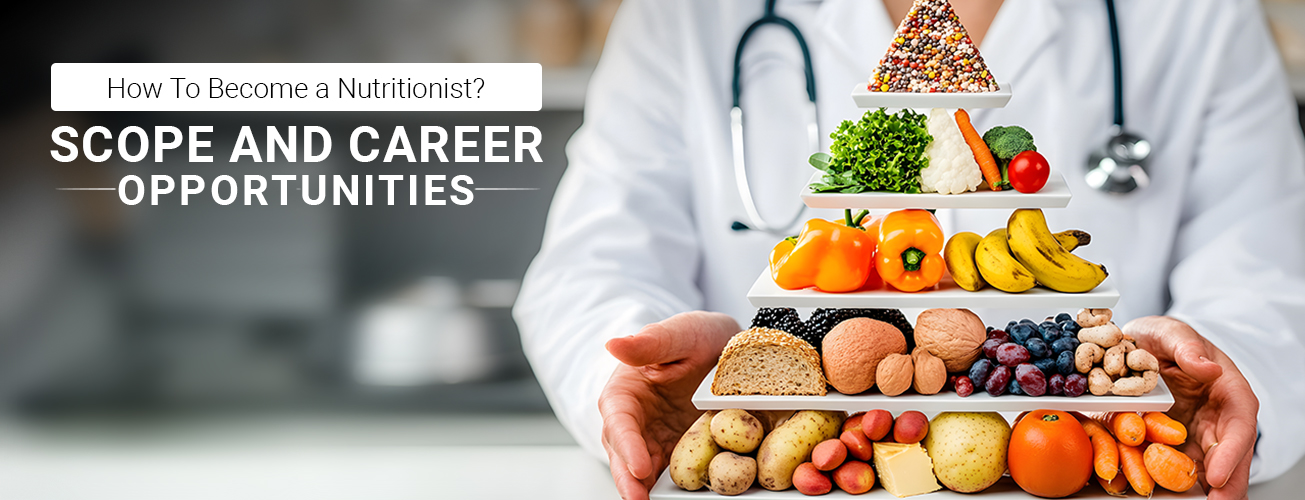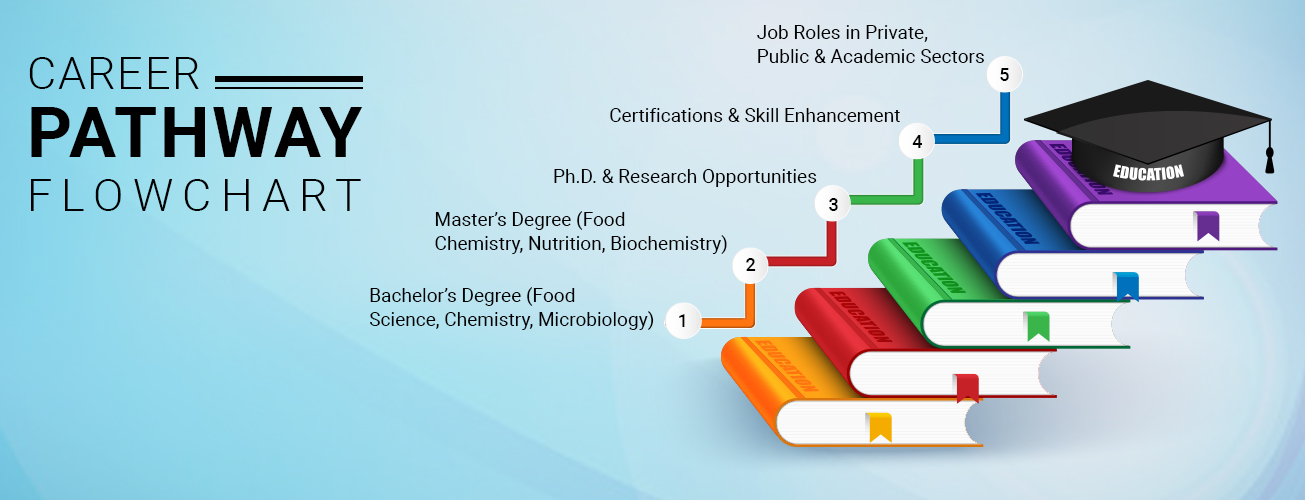How to Become a Food Scientist?
17 Jun 2020

Introduction
With the ever-growing crisis regarding food safety, nutrition, and sustainability, demand for specialists in food science is increasing. Food scientists are critical players in setting the pace of the global food industry: from reducing food wastage, setting up plant-based alternatives, to new food packaging industries.
For instance, the food contamination crisis by melamine in 2008 or the outbreak of E. coli in Germany in 2011 pointed to a stark need for capable food scientists with fair knowledge in safety regulations, food chemistry, and developments in food technology.
If you love food, technology, and science and want to find out how to become a food scientist, this article will take you through the road from academics to work.
What Does a Food Scientist Do?
For somebody to get to be a food scientist, firstly he has to know what food scientists do.
Food scientists research, develop, and test a variety of ingredients and foods, making sure they are safe for consumption by humans.Using their knowledge in life and physical sciences, they innovate new technologies and procedures for food production, processing, and packaging. They also carry out regulatory aspects, ensuring the finished products meet quality and safety standards as laid down by the food laws and regulations of that country. They use scientific techniques to specify accurate nutritional information for food labelling; research new methods to keep food fresh and safe for a longer duration; work on processing methodologies to reduce time and cost while maintaining nutrients and quality; ensure that the food is safe and does not have any risk of contamination.
In private sector, most food scientists work in the R&D departments of food processing companies. Many work in processing plants as quality control inspectors or production supervisors. Some are involved in teaching and research in universities. Others work in sales or advertising of food products and technologies.
Requirements for Becoming a Food Scientist:
- Knowledge of analytical methods and instruments.
- One should have expertise in food chemistry and food microbiology.
- Skills like good communication, critical thinking, observation, data analysis, decision-making, and mathematics.
- A post-graduate degree in food science or a related subject is highly desirable.
- People with Ph.D. degree are often hired for higher positions.
Step by Step Guide to Become a Food Scientist
Step 1: Get a Bachelor's Degree Program
If one plans to become a food scientist, they will need a bachelor's degree in some form of food science or chemistry, microbiology, or a related field. The bachelor program in India comprises a 3 year B.Sc- Food Science and Technology program or a 4-Year B. Tech program in Food Technology. These courses impart students with fundamental principles in food science as well as research techniques. Subjects like human nutrition, food chemistry, food microbiology, food processing, food quality etc.
Step 2: Earn an Advanced Degree
An advanced degree, such as a Master of Science or Ph.D. in Food Science is required for food scientist position in various government laboratories, authorities like BIS and FSSAI, or university research posts like CFTRI, ICAR, DFRL etc. A graduate in Food Science can opt for a specialization in food chemistry, manufacturing processes, or engineering for master's degree. Master program is of 2 years which includes research/ project work with thesis on a topic in food science, nutrition, or biochemistry. Ph.D. programs may take 3-4 years, with intense research work and thesis and research publications on any current/ upcoming technology, product or packaging, bio-chemistry or nutrition.
Career Pathway Flowchart:

- Step 1: Bachelor’s Degree (Food Science, Chemistry, Microbiology)
- Step 2: Master’s Degree (Specializations: Food Chemistry, Nutrition, Biochemistry)
- Step 3: Ph.D. & Research Opportunities
- Step 4: Certifications & Skill Enhancement
- Step 5: Job Roles in Private, Public & Academic Sectors
Step 3: Attend Workshops/Certification Programs
One can always earn better opportunities by upgrading the knowledge with various short-term workshops or certification courses like ISO, HACCP, regulatory, or recent technologies by various universities or government authorities. Certification is based on successfully completing a qualifying exam. Interested individuals can also take advantage of online study.
Certifications & Skill Development
For those interested in becoming a food scientist, certifications can boost employability and specialization:
- FSSC 22000 – Food Safety Management Certification
- ISO 22000 – Global standard for food safety
- HACCP – Hazard Analysis and Critical Control Points
- Six Sigma in Food Safety – Ensures process quality
- GMP (Good Manufacturing Practices) – Required for quality compliance
Internships with established food companies, industry visits, and active participation in professional food science bodies can help build valuable industry exposure and networks.
Job Opportunities of a Food Scientist
- Research and development departments of all food companies like Nestle, Britannia, Cadbury, Pepsico etc.
- All government universities under ICAR, CSIR, CFTRI etc. as research scientists.
- Government Regulatory bodies like BIS, FSSAI, FFRC,DFRL, WHO, NIN, ICMR etc.
- All government and private universities as professors, involved in teaching as well as research.
- One can apply for research projects independently, for which government provide proper funding.
- Research project collaborations can be done with foreign universities also.
Expanding Career Scope in Food Science

Besides traditional roles, food scientists today explore various non-traditional career paths:
- Entrepreneurship: Start your own food tech startup or organic food brand.
- Food Consultancy: Advise companies on product development or food safety compliance.
- Food Journalism & Content Creation: Report and write on scientific trends in the food industry.
- Product Innovation: Develop sustainable and alternative protein sources like lab-grown meat or algae-based foods.
Future Trends in Food Science
Food science is being reshaped by technology and sustainability:
- AI and Machine Learning for predictive food safety analysis.
- Blockchain for transparent food traceability in the supply chain.
- 3D Food Printing for personalized nutrition.
- Eco-friendly Packaging innovations to reduce plastic use.
- Alternative Proteins such as insect protein or plant-based meat.
Global Opportunities for Food Scientists
If you're considering a global career, becoming a food scientist opens doors internationally:
- USA & Canada: High-paying R&D and regulatory jobs in FDA, USDA, and private food companies.
- Europe: Food innovation hubs in Netherlands, Germany, and France.
- Australia: Known for research roles and public sector opportunities.
Top scholarships for international study in food science include:
- Erasmus+ (Europe)
- Fulbright (USA)
- DAAD (Germany)
- Commonwealth Scholarship (UK)
Industry Success Stories
- Nestlé’s iron-fortified cereals were developed with food scientists to combat anemia in children.
- Unilever created shelf-stable ice cream using innovative emulsifiers discovered through food science R&D.
- Beyond Meat and Impossible Foods changed the game in plant-based food innovation, all powered by food scientists.
Salary of a Food Scientist
Starting salary after a master's degree maybe around ₹40,000–₹60,000 per month which may gradually increase with experience up to ₹1–2 lakhs per month.
Global Salary Comparison:
|
Country
|
Entry-Level Salary
|
Senior-Level Salary
|
|
India
|
₹4–7 LPA
|
₹12–24 LPA
|
|
USA
|
$50,000–$70,000/year
|
$100,000–$130,000/year
|
|
Canada
|
CAD 55,000–80,000/year
|
CAD 100,000/year+
|
|
UK
|
£25,000–£35,000/year
|
£50,000/year+
|
Freelancing as a food safety consultant, product reviewer, or regulatory specialist is also a growing option among experienced professionals.
Career Options in Food Science – At a Glance
|
Sector
|
Role Examples
|
Salary Range
|
Growth Potential
|
|
Private Sector
|
R&D, Quality Control, Product Dev
|
₹4–20 LPA
|
High
|
|
Public Sector
|
Regulatory Officer, Scientist, Inspector
|
₹5–15 LPA
|
Medium to High
|
|
Academia
|
Professor, Research Fellow
|
₹4–12 LPA
|
High (with PhD)
|
|
Entrepreneurship
|
Food Startup Founder, Consultant
|
Variable
|
Very High
|
Conclusion
Now that you have learned about how to become a food scientist, you can see that there are many possibilities in this career path, old and new. Whether you want to help with safety regulations, sustainable production, or be involved with the next food innovation, becoming a food scientist will benefit both you and society.
FAQs
1. What is the qualification for a food scientist?
At least a bachelor's degree in Food Science, Food Technology, or any other related subjects such as biology, chemistry, or microbiology is needed to become a food scientist. These subjects impart some elementary knowledge regarding composition and safety aspects of food. For research activities or for an academic position, it might be more suitable to pursue an M.Sc. or Ph.D. It may be advantageous for career enhancement to have practical lab experience and certification in food safety and quality control.
2. How to get started as a food scientist?
Start by earning a bachelor's degree in Food Science, Food Technology, or a related field such as biology or chemistry. During your studies, you should gain as much practical experience as possible through internships or working in a lab. This will position you well if you decide to go for further certifications in food safety, HACCP, or quality control. Entry-level jobs are the best way to garner experience in food manufacturing or research labs. Staying current in this area through training and networking will help your career grow.
3. Which degree is best for food science?
The most suitable and famous degree is a Bachelor of Science (B.Sc.) in Food Science or Food Technology. The course content includes studying food chemistry, microbiology, nutrition, and food safety. An M.Sc. or Ph.D. in Food Science or something related, like Biochemistry or Agricultural Science, should be pursued if someone wants to go to a specialized profession or science research career.






